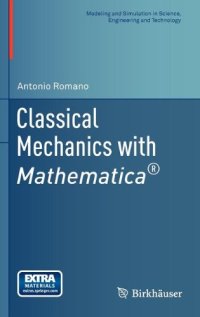
Ebook: Classical Mechanics with Mathematica®
Author: Romano Antonio (auth.)
- Genre: Physics // Mechanics
- Tags: Differential Geometry, Mechanics, Mathematical Physics, Fluid- and Aerodynamics, Continuum Mechanics and Mechanics of Materials, Mathematical Methods in Physics
- Series: Modeling and Simulation in Science Engineering and Technology
- Year: 2012
- Publisher: Birkhäuser Basel
- Edition: 1
- Language: English
- pdf
This textbook takes a broad yet thorough approach to mechanics, aimed at bridging the gap between classical analytic and modern differential geometric approaches to the subject. Developed by the author from 35 years of teaching experience, the presentation is designed to give students an overview of the many different models used through the history of the field—from Newton to Lagrange—while also painting a clear picture of the most modern developments. Throughout, it makes heavy use of the powerful tools offered by Mathematica.
The volume is organized into two parts. The first focuses on developing the mathematical framework of linear algebra and differential geometry necessary for the remainder of the book. Topics covered include tensor algebra, Euclidean and symplectic vector spaces, differential manifolds, and absolute differential calculus. The second part of the book applies these topics to kinematics, rigid body dynamics, Lagrangian and Hamiltonian dynamics, Hamilton–Jacobi theory, completely integrable systems, statistical mechanics of equilibrium, and impulsive dynamics, among others.
Unique in its scope of coverage and method of approach, Classical Mechanics will be a very useful resource for graduate students and advanced undergraduates in applied mathematics and physics who hope to gain a deeper understanding of mechanics.
- Offers a unique and broad approach to mechanics, integrating linear algebra, analysis, and differential geometry - Provides an illuminating historical perspective on the subject, including the models of Newton, Euler, Lagrange and Hamilton - Gives a treatment of impulsive dynamics, rarely found elsewhere in the literatureIncludes over 200 carefully crafted excercises, frequently making use of Mathematica - Suitable for both graduate and advanced undergraduate students This textbook takes a broad yet thorough approach to mechanics, aimed at bridging the gap between classical analytic and modern differential geometric approaches to the subject. Developed by the author from 35 years of teaching experience, the presentation is designed to give students an overview of the many different models used through the history of the field—from Newton to Lagrange—while also painting a clear picture of the most modern developments. Throughout, it makes heavy use of the powerful tools offered by Mathematica®. The volume is organized into two parts. The first focuses on developing the mathematical framework of linear algebra and differential geometry necessary for the remainder of the book. Topics covered include tensor algebra, Euclidean and symplectic vector spaces, differential manifolds, and absolute differential calculus. The second part of the book applies these topics to kinematics, rigid body dynamics, Lagrangian and Hamiltonian dynamics, Hamilton–Jacobi theory, completely integrable systems, statistical mechanics of equilibrium, and impulsive dynamics, among others. With a unique selection of topics and a large array of exercises to reinforce concepts, Classical Mechanics with Mathematica is an excellent resource for graduate students in physics. It can also serve as a reference for researchers wishing to gain a deeper understanding of both classical and modern mechanics. Content Level » Graduate Keywords » Lagrangian and Hamiltonian dynamics - classical mechanics, Mathematica - differential geometry - kinematics - linear algebra - rigid body dynamics